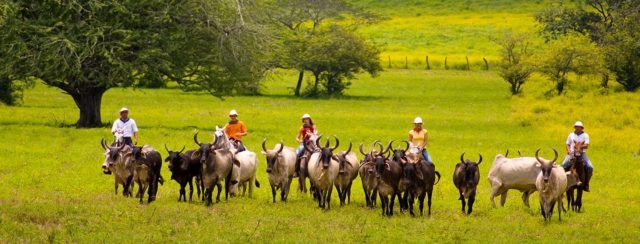The tourism industry contributes 6.3% of the Gross Domestic Product (GDP) to the Costa Rican economy if the direct and indirect contributions are added the figure reaches 8.2%. According to data provided by the Costa Rican Tourism Institute (ICT), about 600 thousand people live from this activity, which represents 24% of the country’s workforce.
Costa Rica is presented as a characteristic country for being a pillar in terms of tourism activities, the entry of a greater number of visitors proposes new demands for products and a modality linked to economic growth, which has tried to nurture traditional tourism of beach and mountains. However, rural tourism is also an attractive and viable option for rural communities and small producers.
Guanacaste, for example, a province known for the charm of its beaches and the development of numerous hotel complexes, continues to be a rural region with socioeconomic indicators below the average. Tourism is an engine of the regional economy; How is rural tourism inserted within this context of large-scale tourism to generate income for families?

Last November, at the Nicoya campus of the National University (UNA), hosted the XI International Congress of rural tourism and sustainable development (Citurdes), with the participation of more than 125 specialists from Mexico, Chile, Brazil, Panama, and Costa Rica, among others.
“We live in a very unique moment: the people of the urban area are awakening to the issues of quality of life are important, not only holidays and leisure but a sustainable lifestyle. This is where rural development enters with an extraordinary offer potential, offering a gastronomic opportunity and a contact with the almost magical nature, it is enriching those people who stopped in their daily world to look for north and a sense of inspiration”, said Andrés Yurjevic, Chilean businessman.
For Alexandre Panosso of the University of Sao Paulo, Brazil, there are 2 major challenges to position rural tourism within the agenda of each country. “The first thing is to put on the table the issue of rural tourism that is a political issue. Then we turn to the issue of education and training for small enterprises, without neglecting the financial support and investment in communities that the Government can make, because tourism attracts those who have money and those who do not, and Generally, rural tourism starts in communities that do not have a lot of income”.
According to Panosso, the issue of education is fundamental because it requires people to train, seek knowledge in universities or other organizations. “We have to have an idea of what is happening in the sector and then work with the management strategies of any other tourism company. Many ones start excited and then close, but it is natural happens in all areas, many times we have successes and failures.
The development of productive linkages and community networks also represents great challenges for rural tourism. “I was visiting projects near Nicoya and people know that the strengthened communities can control other evils not only with respect to their income but also others such as violence or delinquency. It is important to strengthen these leaderships mainly in women. Another aspect is the sensitivity that municipalities must have to put themselves at the service of the communities and a committed University that takes initiatives that are not outside the people’s control capacity”, said Yurjevic.
According to Aurora Hernández, coordinator of Citurdes, this rural offer must also be made known. “Although Guanacaste is characterized by a beach and sun tourism, there are other communities where you live from the rural, from that everyday field, and that can offer an authentic experience of relationship with nature, culture, and activities such as livestock. These options must also be presented by the tour operators, where today many of our students know the small producer and the new ventures, so they are capable of taking tourists and guiding the entrepreneur in their development “.
The Citurdes was held for the first time in a Central American country by a joint effort of the UNA and the Federal University of the State of Rio Grande do Sul.
